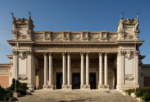56. Biennale – Ivan Grubanov
.jpg)
Ivan Grubanov rappresenta la Serbia alla 56. Biennale di Venezia col progetto United Dead Nations.
Comunicato stampa
The Ministry of Culture of the Republic of Serbia and the Foundation of the Museum of Contemporary Art, Belgrade are pleased to announce that Ivan Grubanov, as the artist, and Lidija Merenik, as the curator and commissioner, are presenting the Pavilion of the Republic of Serbia at the 56th Venice Biennale with the project United Dead Nations. The official opening will take place on May 7 at 13h at the Pavilion of the Republic of Serbia in the Giardini della Biennale, Venice.
United Dead Nations is a project of memory in times of post-history. Its locus is chosen to be the former Yugoslav, now Serbian Pavilion—seen from the venue's own historical perspective of national and state order, political movements and crises experienced from the time of the Pavilion's foundation at the Venice Biennale in 1938 until today. Through a floor installation, the artist Ivan Grubanov will examine ideological, political and cultural terms of "nation/state/state of nations," and the process of their creation, rule and disappearance. This process is symbolically represented through various ritualistic and artistic interventions made on flags of countries, which have, due to political upheavals, stopped existing as such since the founding of the Venice Biennale in 1895: the Austro-Hungarian Empire (1867–1918), the Ottoman Empire (1299–1922), Gran Colombia (1819–1930), Tibet (1913–51), United Arab Republic (1958–71), South Vietnam (1955–75), German Democratic Republic (1949–90), USSR (1922–91), Czechoslovakia (1918–92) and Yugoslavia (1918–2003).
The project's title United Dead Nations introduces a pun on the UN organization's title on associative and poetic levels, but also a connection with the historical and cultural paradigm of the Venice Biennale, a unique gathering of "united artistic nations." One of the achievements of the Biennale has been (or was) to bring together contemporary art and the national-state representation through organizing national pavilions and presentations, thus appearing as a microcosm of the unbreakable bond between art and the politics of a bygone era of the Modern. By deconstructing the concept of national-state representation, one might instigate a discourse on the meaning of the term "nation" in post-global age, when the national state retreats before the trans-national and supra-national forms of organizing—conglomerates, political, military and economic alliances which represent huge concentrations of power and influence.
Ivan Grubanov (b. 1976 in Belgrade) received education at the Painting Department of the Belgrade Academy of Fine Arts, the Rijksakademie van beeldende kunsten in Amsterdam, Delfina Studios in London, Casa de Velazquez in Madrid and University of Leuven – KU Leuven. Grubanov's ideas and his work achieve independence over political speech through artistic and critical interpretation of historical memory, and thus evade the unwanted banalization of artistic speech. They negate the concept of the work of art as a closed, static aesthetic object, while maintaining the identity of an autochthonous analytical and critical post-painterly practice of the open system of interpretation. With the series of drawings Visitor (2002–04), made during the Slobodan Milošević's trial at the International Court of Justice in the Hague, he made a break-through on the international art scene. His work has been exhibited in numerous solo, group, and biennial exhibitions worldwide since 1997 (Salon of the Museum of Contemporary Art, Belgrade, the 10th Istanbul Biennial, Witte the With in Rotterdam, Stedelijk Museum in Amsterdam, and many more), as well as awarded by several artistic and scholarly awards.
Lidija Merenik is Professor at the Art History Department, Faculty of Philosophy, University of Belgrade.
Contact
Serbian Press: Ana Bogdanovic, [email protected]
International Press: Claudia Zini, [email protected]



